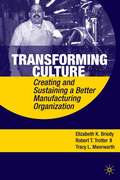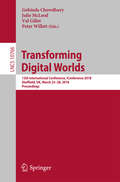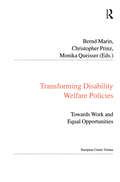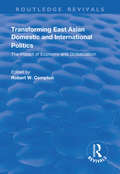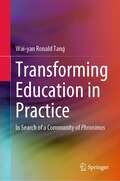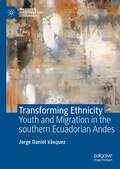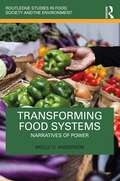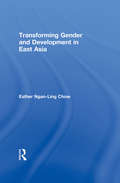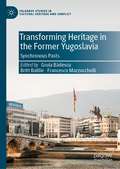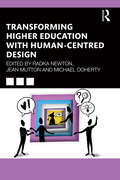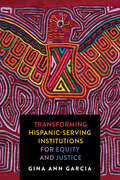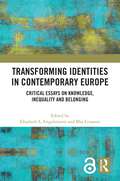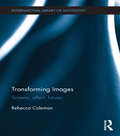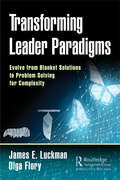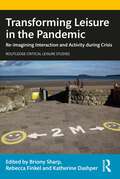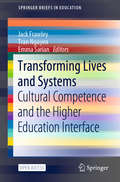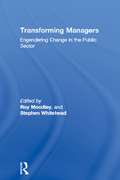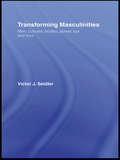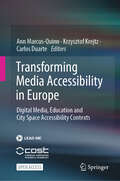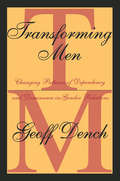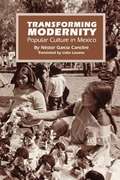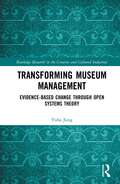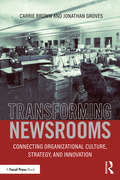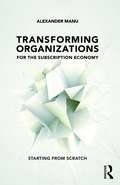- Table View
- List View
Transforming Culture
by Elizabeth K. Briody Robert T. Trotter II Tracy L. MeerwarthTransforming Culture offers a discussion and exploration of American work culture that can serve as a guide for organizational-culture change through the description and explanation of a model for change used at GM. The book describes the model, discusses culture-change tools that were derived from it and descriptions of how the tools work.
Transforming Digital Worlds: 13th International Conference, Iconference 2018, Sheffield, Uk, March 25-28, 2018, Proceedings (Lecture Notes in Computer Science #10766)
by Julie McLeod Gobinda Chowdhury Val Gillet Peter WillettThis book constitutes the proceedings of the 13th International Conference on Transforming Digital Worlds, iConference 2018, held in Sheffield, UK, in March 2018. The 42 full papers and 40 short papers presented together with the abstracts of 3 invited talks in this volume were carefully reviewed and selected from 219 submissions. The papers address topics such as social media; communication studies and online communities; mobile information and cloud computing; data mining and data analytics; information retrieval; information behaviour and digital literacy; digital curation; and information education and libraries.
Transforming Disability Welfare Policies: Towards Work and Equal Opportunities (Public Policy and Social Welfare)
by Christopher PrinzBringing together contributions from institutions such as the OECD, the WHO, the World Bank and the European Disability Forum, as well as policy makers and researchers, this volume focuses on disability and work. The contributors address a wide range of issues including what it means to be disabled, what rights and responsibilities society has for people with disabilities, how disability benefits should be structured, and what role employers should play. Fundamental reading for specialists in disability, social protection and public economics, and for social policy academics, researchers and students generally, Transforming Disability Welfare Policies makes an enormous contribution to the literature.
Transforming East Asian Domestic and International Politics: The Impact of Economy and Globalization (The\international Political Economy Of New Regionalisms Ser.)
by Robert ComptonThis title was first published in 2002: This text attempts to bridge the gap between international relations and comparative politics, with particular reference to East Asia. The book begins with an exploration of the theme of globalization and the impact it has on the conduct of international relations and the process of domestic politics. It discusses the fact that domestic actors are unable to assume an insular political environment as previously, referring to the constant reception of stimuli which force adjustments to approaches in the conduct of domestic and international affairs. Globalization's ubiquitous presence reflects a changed reality for both state and non-state actors - no policy-maker can afford to ignore or underemphasize its role in shaping ior altering the course of public
Transforming Education in Practice: In Search of a Community of Phronimos
by Wai-yan Ronald TangThis book inspires educational practitioners with special regard to the way how practice in the frontline service is able to inform leadership and policy decision. It empowers them to identify what features are counted as professional and how they could be turned into sources for developing wise judgment and eliciting creative acts in teaching, lesson planning and course design, collaboration, and knowledge excavation to shape policy decision and planning. In addition, for those who are used to conceive the world and their practice from a positivist tradition may find the insights of this book illuminating particularly when they are looking for a paradigm shift in understanding their practice. Last but not least, educators and teacher educators in particular will find the ideas in this book more promising in escalating the awareness of teachers of the next generation towards what is ‘good’ (phronesis) in terms of their professional attitude and actual performance (informed by both techne and episteme) in their relevant settings.
Transforming Ethnicity: Youth and Migration in the Southern Ecuadorian Andes (Migration, Diasporas and Citizenship)
by Jorge Daniel VásquezThis book explores how global migration transforms local dynamics in the communal life of indigenous peoples in southern Ecuador. At its heart, the focus is on Cañar, a region marked by more than seven decades of migratory flows to the United States. Cañar features one of the areas of greatest human mobility in the entire Andean Region. Drawing on data from in-depth interviews and dialogue-based workshops with indigenous youths, the author shows how migratory processes and forms of self-representation have challenged the idea that ethnic identity is tied to fixed cultural patterns. He further shows how youths’ transnational experiences reconfigure generational differences within indigenous communities. In analyzing how transnational life, adultcentrism, gender power dynamics, and institutional discourses intersect in the production of indigenous youths’ subjectivities, this book provides an innovative approach to the studies of indigenous peoples and migration.
Transforming Faces for the Screen: Horror and Romance in the 1920s
by Karen Randell Alexis WeedonThis book brings together research from medical and film archives to illustrate the cultural impact of film and literature in its relationship to the discourse of plastic surgery in the 1920s. This different take on reading the body after the First World War enables students of multiple disciplines, and readers interested in both Hollywood and post-war culture, to understand some of the complexities of medical interventions gained after the First World War and the way in which they filtered into the world of Hollywood film making. It also allows readers who may not be familiar with these two 1920s stars to access the films of Lon Chaney and the books and films of Elinor Glyn and gain new insights into 1920s visual culture. For ease of readership, the book is organised so that each of the main chapters focuses on a particular film (either Lon Chaney or Elinor Glyn). This is particularly useful for use in the classroom or for online education. Readers can refer to the film directly, aided by illustrations of frames from the films. This book tells the story of how two stars of Hollywood film transformed their character’s faces on screen through a close reading of three films in the 1920s. It reveals how they applied their embodied knowledge of surgery and surgical procedures to broaden their audience’s emotional and intellectual understanding of the treatment of deformity and disability.
Transforming Food Systems: Narratives of Power (Routledge Studies in Food, Society and the Environment)
by Molly D. AndersonThis book focuses on the contested nature and competing narratives of food system transformations, despite it being widely acknowledged that changes are essential for the safeguarding of human and planetary health and well-being.The book approaches food system transformation through narratives, or the stories we tell ourselves and others about how things work. Narratives are closely connected with theories of change, although food system actors frequently lack explicit theories of change. Using political economy and systems approaches to analyze food system transformation, the author focuses on how power in food systems manifests, and how this affects whom can obtain healthy and culturally appropriate food on a reliable basis. Among the narratives covered are agroecology, food sovereignty and technological innovation. The book draws on interviews and recorded speeches by a broad range of stakeholders, including international policymakers, philanthropists, academics and researchers, workers in the food and agricultural industries and activists working for NGOs and social movements. In doing so, it presents contrasting narratives and their implicit or explicit theories of change. This approach is vitally important as decisions made by policymakers over the next few years, based on competing narratives, will have a major influence on who will eat what, how food will be produced, and who will have a voice is shaping food systems. The overarching contribution of this book is to point toward the most promising pathways for achieving sustainable food systems and refute pathways that show little hope of achieving a more sustainable future.This book will be of great interest to students, scholars and policymakers interested in creating a sustainable food system which will ensure a food secure, socially just and environmentally sustainable future.
Transforming Gender and Development in East Asia
by Esther Ngan-ling ChowTransforming Gender and Development in East Asia brings together a collection of original essays from top scholars in the United States and Asia to explore the centrality of gender in the process of economic development in East Asia. Contributors demonstrate through ethnography, personal narratives, field observation, and in-depth interviews the essential parts women have played in the national growth, economic restructuring, and industrialization of East Asian countries, including South Korea, Taiwan, China, Hong Kong, Singapore, and China.
Transforming Heritage in the Former Yugoslavia: Synchronous Pasts (Palgrave Studies in Cultural Heritage and Conflict)
by Britt Baillie Gruia Bădescu Francesco MazzucchelliHeritage became a target during the Yugoslav Wars as part of ethnic cleansing and urbicide. Out of the ashes of war, pasts were remodelled, places took on new layers of meaning, and a wave of new memorialization took hold. Three decades since the fall of Vukovar and the end of the siege of Sarajevo, and more than a decade since Kosovo’s Declaration of Independence, conflict has shifted from armed confrontations to battles about the past. The former Yugoslavia has been described on the one hand as a bastion of plurality and multiculturalism, and on the other, as a territory of antagonism and radical nationalisms, echoing imaginaries and narratives relevant to Europe as a whole. With Croatia having entered the EU in 2013 and the continuous political contestation in the region, wounds in the memory fabric of the former Yugoslavia have once more come to the world’s attention. Thus, there is the question what will happen when the former republics are ‘reunited’ once more under the EU umbrella, itself beset by increasing populisms, nationalisms, and the looming prospects of territorial fragmentation. This collection scrutinizes the role of heritage in ‘conflict-time’, inquires what role the past might have in creating new identities at the local, regional, national, and supra-national levels, and investigates the dynamics of heritage as a process.
Transforming Higher Education With Human-Centred Design
by Radka NewtonEncouraging a collaborative and thoughtful approach to the wicked problems facing higher education (HE), this book is a showcase of pioneering educators who believe that well-designed education is good for everyone - learners, teachers, education administrators, the learning organisation and the world.Through case studies, thought pieces and practical advice, this book takes a fresh look at the application of Design Thinking and Service Design in a variety of university contexts. Human-centred design perspectives show up the fact that decades of rhetoric about student-centred learning have often left the student still effectively marginalised from change processes. The reader will encounter ample tools and techniques of design and co-creation that can enhance the student experience, from applicant to alumnus. More importantly, the book sets out, in actionable ways, how we can make our universities more effective at supporting students for success, and to become places where people are more empowered to make those changes. University academics, learning support staff, managers and professional staff, as well as HE policy makers and professional bodies, will appreciate this clear and practical guide to exploring service design in the new context of education.
Transforming Hispanic-Serving Institutions for Equity and Justice
by Gina Ann GarciaThe framework to help Hispanic-Serving Institutions transform into spaces of liberation that promote racial equity and social justice.Beyond having over a quarter of their undergraduate students be Hispanic, what makes Hispanic-Serving Institutions (HSIs) uniquely Latinx? And how can university leaders, faculty, and staff transform these institutions into spaces that promote racial equity, social justice, and collective liberation?In Transforming Hispanic-Serving Institutions for Equity and Justice, Gina Ann Garcia argues that in order to serve Latinx students and other students of color, these institutions must acknowledge how whiteness operates across the organization, from the ways that it is governed and how decisions are made to how education and knowledge are delivered. Diversity alone is insufficient for achieving a dynamic learning environment within higher education institutions. Garcia's framework for transforming HSIs into truly Latinx institutions is grounded in critical theories, yet it advances new ways of thinking about how to organize colleges and universities that are actively serving students of color, low-income students, and students from other minoritized backgrounds. This framework connects multiple important dimensions, including mission, identity, strategic purpose, membership, curriculum, student services, physical infrastructure, governance, leadership, external partnerships, and external influences. Drawing on over 25 years of HSI research, Garcia offers unique solutions for colleges and universities that want to better serve their students. With over 550 colleges and universities already eligible for the HSI designation, this book is a must-read for everyone in higher education.
Transforming Identities in Contemporary Europe: Critical Essays on Knowledge, Inequality and Belonging
by Elisabeth L. EngebretsenInterdisciplinary in perspective, this book explores contemporary struggles around ‘identity politics’ in Europe, offering a unique glimpse into contemporary tensions and paradoxes surrounding identities, belonging, exclusions and their deep-seated gendered, colonial and racist legacies. With a particular focus on the Nordic region, it provides insights into the ways in which people who find themselves in minoritized positions struggle against multiple injustices. Through a series of case studies documenting counter-struggles against racist, colonialist, sexist forms of discrimination and exclusion, Transforming Identities in Contemporary Europe asks how the paradigm and politics of the welfare state operate to discriminate against the most marginalized, by instating a naturalized hierarchy of human-ness. As such it will appeal to scholars across the social sciences and humanities with interests in race, gender, colonialism and postcolonialism, citizenship and belonging.
Transforming Images: Screens, affect, futures (International Library of Sociology)
by Rebecca ColemanContemporary social and cultural life is increasingly organised around a logic of self-transformation, where changing the body is seen as key. Transforming Images examines how the future functions within this transformative logic to indicate the potential of a materially better time. The book explores the crucial role that images have in organising an imperative for transformation and in making possible, or not, the materialisation of a better future. Coleman asks the questions: which futures are appealing and to whom? How do images tap into and reproduce wider social and cultural processes of inequality? Drawing on the recent ‘turns’ to affect and emotion and to understanding life in terms of vitality, intensity and ‘liveness’ in social and cultural theory, the book develops a framework for understanding images as felt and lived out. Analysing different screens across popular culture – the screens of shopping, makeover television programmes, online dieting plans and government health campaigns – it traces how images of self-transformation bring the future into the present and affectively ‘draw in’ some bodies more than others. Transforming Images will be of interest to students and scholars working in sociology, media studies, cultural studies and gender studies.
Transforming Leader Paradigms: Evolve from Blanket Solutions to Problem Solving for Complexity
by James E. Luckman Olga FloryAn easy read with clear examples and engaging stories, this book is a treat for leaders who are interested in totally transforming the way they work. Luckman and Flory help leaders and organizations shift from a solutions mindset to a problem-solving culture that results in flow and growth where everyone in the organization can become a winner. Anand V. Tanikella, Vice President R&D, Abrasives Worldwide, Saint-Gobain Luckman and Flory explain how to create a platform for change and a culture of meaningful continuous improvement through what they call "Problem Solving for Complexity." This approach is about engaging everybody in the organization to improve every aspect of how work gets done. Read this book if you want to be a real change leader, not just the person who goes around talking about the need for change. Robert Kessiakoff, Coach/Consultant, Partner LTGe, Sweden [This book] describes how the leader, through changing his or her own behaviors and practices, can transform an organization that is slow to adapt into one that solves problems organically. The book is an important read for leaders and managers at all levels. Peter Ward, Senior Associate Dean for Academics, Richard M. Ross Chair in Management, Professor of Management Sciences, Director, Center for Operational Excellence, Ohio State University Organizational transformation is difficult, and despite expensive continuous improvement programs, most change efforts fail. This pattern, James E. Luckman and Olga Flory argue, is due to the fact that most change efforts start with senior leaders assigning an external or internal consulting group to attempt to drive change from the top down. Leaders today can no longer roll out solutions in the hopes of seeing better results. What they can do is play an active role in helping to transform their organization from "blanket solutions" thinking to learning how to solve complex business problems in a rapidly changing world. Drawing upon decades of leadership experience and years of research with executives across many different industries, Luckman and Flory make a persuasive case that most companies have not been able to stay ahead in what is an increasingly turbulent business environment because they simply have not made the cultural changes required to do so. In discussing how to facilitate this culture change, the authors share a model for leadership designed to guide an organization to extraordinary new levels of performance by focusing on three key areas: building a framework for problem-solving, encouraging respectful communication, and accelerating the pace at which the organization learns. The result is more energized team members who are dedicated to their daily work in an organization that is better positioned to achieve operational excellence. Readers will also find powerful stories from executives who have effectively changed their approach to leadership, all of which serve to inspire more leaders to take the leap and become "problem-solvers for complexity." Transforming Leader Paradigms is a book about strengthening every organization’s capacity to solve complex business problems. But, more importantly, it’s about what leaders must change in themselves to help their team members solve problems methodically, start to look at the world differently using complexity theory, and understand what it means to create real value for customers. For leaders who are willing to examine their own behaviors, this book is a welcome change from the steady stream of business books on the market that emphasize charismatic and/or heroic leadership as the key to achievement and success.
Transforming Leisure in the Pandemic: Re-imagining Interaction and Activity during Crisis (Routledge Critical Leisure Studies)
by Rebecca Finkel Briony Sharp Katherine DashperThis is the first book to critically explore international leisure during the COVID-19 pandemic. It analyses the ways in which the pandemic has impacted upon our leisure practices and our leisure lives, focusing on three key spaces ・ public, private, and digital. The book seeks to understand how changes in leisure have led to transformations in the ways we have had to ‘do’ and ‘redo’ activities, such as incorporating digitalisation and distancing measures, as well as dealing with restrictions on social interaction, gatherings, and cultural activities. It presents a series of case studies covering topics as diverse as music festivals, theatre on-screen, walking, static cycling, smartphone use, holidays, and the ‘lockdown leisure’ of preschool children, including people across the life course, from young children to older retired people. The book discusses changes in patterns of behaviour, leisure experiences, and leisure environments worldwide and critically re-evaluates what leisure is and what it means in contemporary societies. It illustrates both the significant impact the pandemic has had on leisure and the important role leisure plays in helping support and maintain individual and community well-being. This is fascinating reading for any student, researcher, or practitioner with an interest in leisure studies, tourism, events, sociology, cultural studies, or performance studies.
Transforming Lives and Systems: Cultural Competence and the Higher Education Interface (SpringerBriefs in Education)
by Jack Frawley Tran Nguyen Emma SarianThis open access book explores the transformative experiences of participants in the University of Sydney’s National Centre for Cultural Competence (NCCC) programs. The establishment of the NCCC was viewed as a critical point of departure for developing an institution-wide agenda of cultural competence. The NCCC’s work since its inception reflects efforts to lay important foundations for cultural change at the University. With the ultimate aim of establishing cultural competence as an agent for transformational change and social justice education, the NCCC has steadily expanded its research and teaching work both within and beyond the University of Sydney. Further, it has developed foundational resources to support and encourage University staff to integrate cultural competence philosophy and pedagogy in their curricula, teaching and research. This includes the ability to engage meaningfully with the cultures, histories and contemporary issues in Aboriginal and Torres Strait Islander communities. The NCCC programs have been designed to encourage participants to learn about who they are and how they can positively impact the transformational change the University has begun.The book presents participants’ reflections on their experiences at the organisational and personal level. Readers will gain insights into a range of topics including cultural competence, communities of practice, policy implementation, and transformative leadership at the interface between higher education and professional lives.
Transforming Managers: Engendering Change in the Public Sector (Gender, Change, And Society Ser.)
by Roy Moodley Stephen WhiteheadIn the 1990s, considerable changes in the political and social world have impacted on the character of both public and private organizations. At a time of increased uncertainty and insecurity in these organizations, new ways of managing and being managed have emerged. Recognising that organizational life is part reflective and determined by dominant social discourses, factors of gender will inevitably be central to the dynamics of organizational change. This book addresses theoretical ideas and mythologies in the examination of gendered organizations. The need to examine men in relation to family, law and society in general is growing, and this book extends this interrogation to work and organizational life. It will be of interest to students in management studies, public sector management and those involved in public policy making as well as students and academics within gender studies and sociology.
Transforming Masculinities: Men, Cultures, Bodies, Power, Sex and Love
by Vic SeidlerCritically exploring the ways in which men and masculinities are commonly theorized, this multidisciplinary text opens up a discussion around such relationships, and shows that, as with feminisms, there is a diversity of theoretical traditions. It draws on a variety of examples, and explores new directions in the complexities of diverse male identities and emotional lives across different histories, cultures and traditions. This book: considers the experiences of different generations explores connections between masculinity and drugs investigates men and masculinities in a post-9/11 world considers new ways of thinking about male violence recognizes the importance of culture and provides spaces to explore different class, ‘race’ and ethnic masculinities. Written in a practical, versatile manner by an established author in this field, it points to new directions in thinking, and makes essential reading for advanced undergraduates, postgraduates and researchers in the fields of sociology, gender studies, politics, philosophy and psychology.
Transforming Media Accessibility in Europe: Digital Media, Education and City Space Accessibility Contexts
by Carlos Duarte Ann Marcus-Quinn Krzysztof KrejtzIn a rapidly evolving digital landscape, accessibility in media has emerged as a crucial frontier for inclusion, equality, and knowledge democracy. The present edited volume "Transforming Media Accessibility in Europe: Digital Media, Education and City Space Accessibility Contexts" is a comprehensive exploration of technological, societal, psychological, and legal aspects of media accessibility in Europe. It offers a comprehensive roadmap for navigating the multifaceted landscape of media accessibility. Through compelling experimental studies, case studies, and forward-looking insights, it elucidates the transformative potential of accessible media across diverse sectors, including education, culture, and smart cities. Crafted as a collaborative effort under the COST (European Cooperation in Science and Technology) LEAD-ME Action (CA19142), this book unites the expertise of researchers, educators, and practitioners. This is an open access publication.
Transforming Men: Changing Patterns of Dependency and Dominance in Gender Relations (Social Policy And Social Theory Ser.)
by Geoff DenchUsing the storyThe Frog Princeas a symbol of traditional awareness of the potential marginality of men in society,Transforming Menproposes that much of patriarchy is a theatrical illusion. Presenting men as more important and powerful than they really are should be seen as a way of controlling them, rather than as a system for dominating women. The author believes that both men and women need to feel that other people are dependent on them.Dench states that women acquire a sense of responsibility through the direct dependence of children, but most men can only come to experience responsibility via women. If women reject the male breadwinning role, then men will never develop the altruistic incentive. Dench urges that men need to be given a greater stake than women in the public realm in order to be the main family providers and become caring members of society. Dispensing with male privileges and formal positions, the author continues, will simply reveal and revive older and deeper problems, to which patriarchy itself was a historical and sociological solution.Dench does not deny the possibility that if men did behave as feminists have asked or expected, then certainly we would be living in a far better world. However, he asserts that it is too simple to just blame men for the fact that this has not happened; perhaps the real failure lies in feminist approaches and theories. Thus, Dench persuasively argues that feminism may be making the male problem worse, not better by insisting on everything from absolute parity to role reversal.Transforming Mencontains examples of many different feminist viewpoints, including those of Margaret Mead, Betty Friedan, and Camille Paglia. It also uses contemporary cultural instances, such as popular movies, television shows, and books, to emphasize its points. This volume presents an intriguing argument regarding feminism versus a patriarchal society. It will provide stimulating reading for all those interested in the feminist debate.
Transforming Modernity: Popular Culture in Mexico
by Néstor García CancliniIs popular culture merely a process of creating, marketing, and consuming a final product, or is it an expression of the artist's surroundings and an attempt to alter them? <P><P>Noted Argentine/Mexican anthropologist Néstor García Canclini addresses these questions and more in Transforming Modernity, a translation of Las culturas populares en el capitalismo. Based on fieldwork among the Purépecha of Michoacán, Mexico, some of the most talented artisans of the New World, the book is not so much a work of ethnography as of philosophy--a cultural critique of modernism. García Canclini delineates three interpretations of popular culture: spontaneous creation, which posits that artistic expression is the realization of beauty and knowledge; "memory for sale," which holds that original products are created for sale in the imposed capitalist system; and the tourist outlook, whereby collectibles are created to justify development and to provide insight into what capitalism has achieved.
Transforming Museum Management: Evidence-Based Change through Open Systems Theory (Routledge Research in the Creative and Cultural Industries)
by Yuha JungMuseums must change to illuminate the histories, cultures, and social issues that matter to their local population. Based on a unique longitudinal ethnographic study, Transforming Museum Management illustrates how a traditional art museum attempted to transform into a more inclusive and community-based institution. Using open systems theory and the Buddhist concept of mutual causality, it examines the museum’s internal management structure and culture, programs and exhibitions, and mental models of museum workers. In providing both theoretical and practical foundations to transform management structures, this accessible volume will benefit stakeholders by proposing a new culture and structure to arts institutions, to change practice to be more relevant, diverse, and inclusive. This book will be an invaluable resource for researchers and advanced students of museum studies, cultural management, arts administration, non-profit management, and organizational studies.
Transforming Newsrooms: Connecting Organizational Culture, Strategy, and Innovation
by Carrie Brown Jonathan GrovesTransforming Newsrooms offers a practical guide to navigating structural and culture change for news organizations facing economic disruption in today’s rapidly changing media landscape. Even when the need for change is obvious, the best ideas and intentions are often not followed by successful execution. This book offers a road map for understanding the obstacles to change in news organizations and how to overcome them. Providing a detailed overview of the ways in which news processes and routines are being fundamentally altered to meet new demands for multimedia, interactivity, and immediacy, the book offers tips to help news organizations better serve communities by understanding what information people need and how they want to engage and collaborate. The book also features a variety of case studies and examples from news organizations of all kinds, including a 10-year in-depth investigation of the Christian Science Monitor, the first national news organization to stop its daily presses for a digital report. Transforming Newsrooms is an invaluable resource for students and media professionals alike, demonstrating how to make research on organizational change actionable and help build a more equitable journalism model that will survive and thrive when we need it most.
Transforming Organizations for the Subscription Economy: Starting from Scratch
by Alexander ManuThe emerging present is a fast-changing context for incumbent organizations, especially in market segments where online behavior is replacing physical proximity, and users engage with digital platforms for the acquisition of products and services. These are platforms that allow users to behave, to leave a mark, and to participate in the community of others, which are the values people now seek. Transforming Organizations for the Subscription Economy: Starting from Scratch aims to prepare executives for a world in which everything is social, augmented and autonomous; objects and spaces will have multiple purposes, capabilities and meanings. This is a new territory full of opportunity which is generally discussed only at the level of technology involved instead of the intellectual level, where the real understanding of the need for transformation resides. The book reveals ideas about what is possible if we transform the present. The narrative is organized around what is actual and what is potential; what is the probable future that we can arrive at through change, and what is the possible future that we can build through transformation. When engaging in transformation, the following strategic question develops: if you were designing your organization today, how would you design it? In other words, how would you go about it starting from scratch? This book provides the intellectual framework that empowers organizations to understand and navigate the emerging present, and to develop and deliver products and services of intrinsic value to users.
